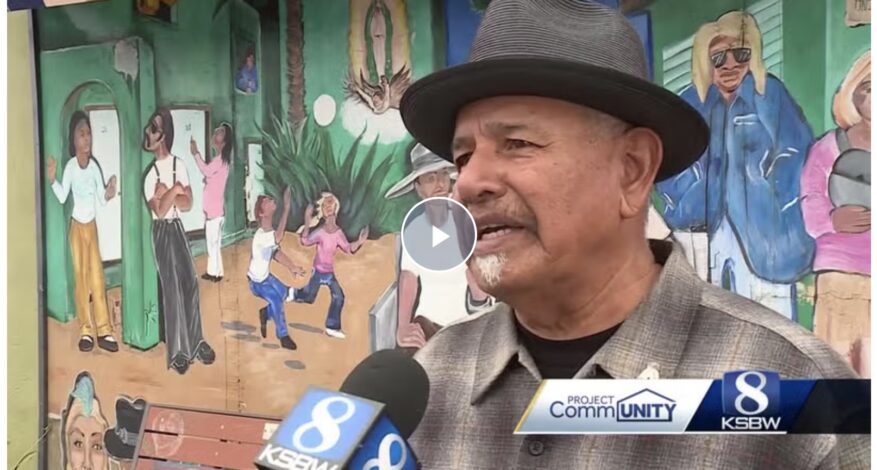From addiction to advocate: Daniel Alejandrez builds Barrios Unidos in Santa Cruz
KSBW Action News | October 10, 2025
Paul Dudley, KSBW News Anchor | View full article and video here.
SANTA CRUZ, Calif. —
Daniel “Nane” Alejandrez, a local leader in Santa Cruz, has dedicated his life to community service after overcoming significant personal challenges, including addiction and the struggles of returning from the Vietnam War.
Alejandrez, who was born into a farm worker family from Mexico, found hope and support at UC Santa Cruz, particularly through the community studies program. He said, “A lot of people thought I didn’t deserve to go to school, but I did go to war.”
Upon returning from Vietnam, Alejandrez faced a new battle on the streets, struggling with heroin addiction. He found hope at UC Santa Cruz. He said, “I was 27-years old, I had two children, and I was trying to look for the best for my family. I wanted an education. I wanted to do something with my life. I wanted to change the direction I had been going. It was challenging but it literally saved my life.”
Alejandrez credits his recovery to the spirit of “Ganas. “What saved me is what I call ‘Ganas,’ the spirit, that you do want to change,” he said. Now sober for over 40 years, Alejandrez has made “Ganas” the core of his life’s work. While a student, he founded the nonprofit Barrios Unidos from his dorm room at UC Santa Cruz. “Barrios Unidos was a crying call for many of us throughout the state, united neighborhoods. We wanted to call for unity. There was too much violence in the streets,” he said.
In the early years, Alejandrez faced skepticism when promoting peace and justice.
“When you are out there by yourself and you start talking peace, justice and end Barrio Warfare, a lot of people didn’t understand what we were saying, they were looking at the way we dress, looking at the way we talk, so the challenge became how do we change those naysayers,” he said.
Barrios Unidos grew over the years, eventually catching the attention of A&E, which featured Alejandrez in a documentary. His violence prevention work was also highlighted by Walter Cronkite in a series called The Hero Report. “At that time, we were doing a lot of policy change, trying to bring resources to communities to deal with the issue of violence, nationally — bringing peace summits together. In 1993 we had a national peace summit. We brought 26 cities to Kansas City to talk about peace,” Alejandrez said.
Today, the Barrios Unidos building spans most of a city block on Soquel Ave in Santa Cruz, offering various services, including a reentry program for people coming out of prison. Sam Cunningham, the program director at Barrios Unidos, shared his transformation story, saying, “I was incarcerated for a lengthy amount of time, and Nane became my mentor.” Cunningham, who was heavily involved in gangs, served 30 years in prison. “When I was getting ready to come home, I didn’t really have anywhere to go, and he told me to find my way to Santa Cruz, he would make sure I was ok in my transition back home,” Cunningham said.
With Alejandrez’s support, Cunningham now works at Barrios Unidos and visits Soledad State Prison twice weekly, offering anger management, domestic violence classes, and mentoring. He tells the men and women inside that they are not always defined by the worst moment in their life. “I try to share that message every single day I go into the institutions and talk to the men and women, their worst decision in their life doesn’t define them,” Cunningham said.
Barrios Unidos also offers support through a food pantry, partnering with several companies to serve hundreds weekly, and a job training program with a screen-printing shop that helps local students. Joaquin Alejandrez, operations director at Barrios Unidos, said, “It builds confidence. It gives them money in their pocket. They are able to help out the family, maybe put food on the table.”
Maya Mendoza from Barrios Unidos emphasized the importance of the organization, saying, “I hear a lot from people that we work with talk about how important it is to literally just have the space.” Mendoza added, “The nonprofit world is obviously very big and diverse but to be a part of a space that has been around so long, and with a man who has done so much work, I feel like I am getting a very well-rounded version of what it means to work in community.”
At its core, Barrios Unidos is about mentorship, with Alejandrez guided by leaders like Harry Belafonte, Danny Glover, César Chávez, and Dolores Huerta. “I have put in over 50 years in this work, so now is about passing it on to the younger generation, as those who went before,” Alejandrez said.
Guided by “Ganas” and the spirit of strength, the work lives on. In the future, Barrios Unidos hopes to expand their facility on Soquel Ave to add affordable housing so people born in Santa Cruz can stay in Santa Cruz.






